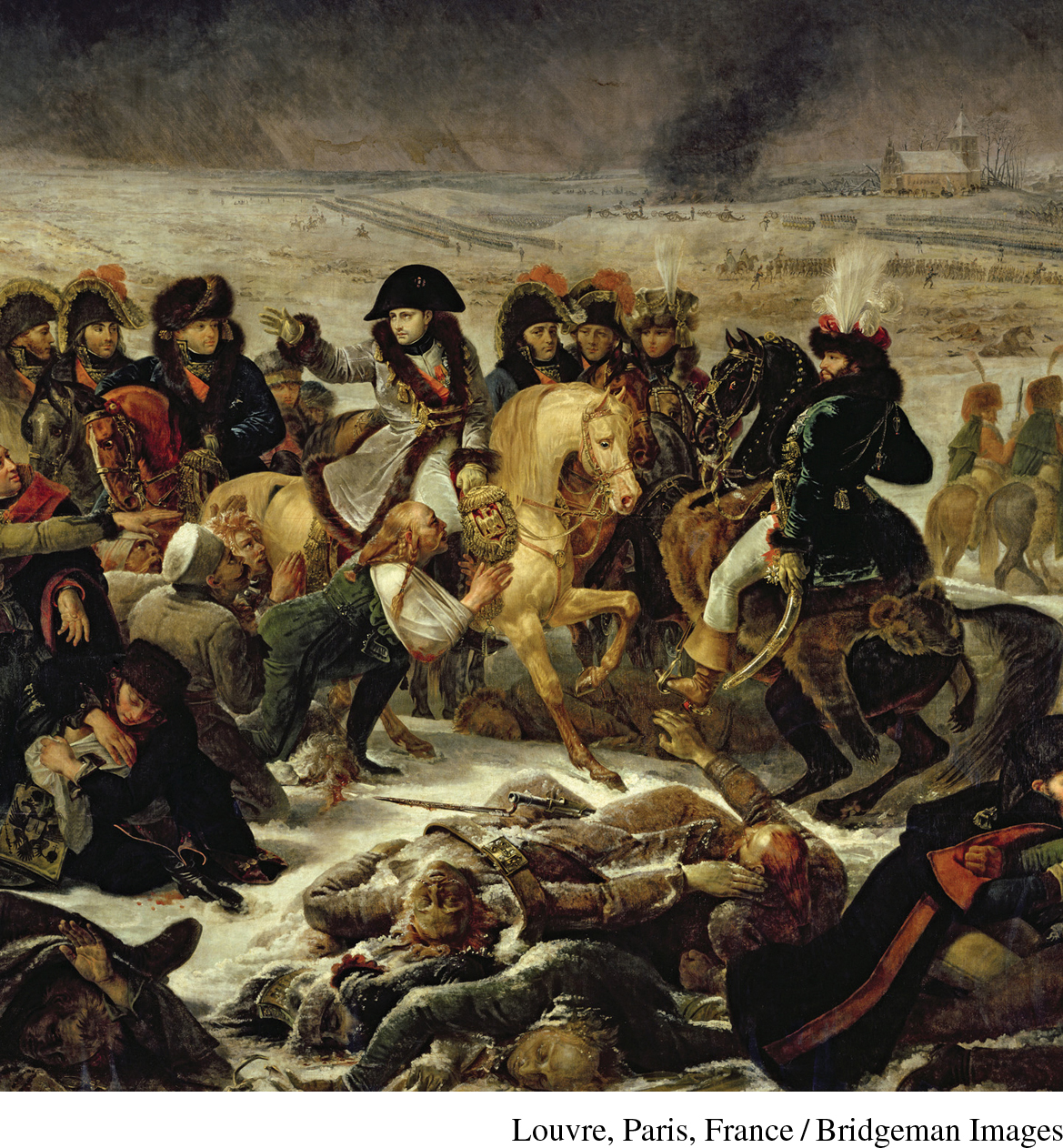The Grand Army and Its Victories, 1800–1807
The Grand Army and Its Victories, 1800–1807
Napoleon attributed his military success “three-quarters to morale” and the rest to leadership and superiority of numbers at the point of attack. Conscription provided the large numbers: 1.3 million men ages twenty to twenty-four were drafted between 1800 and 1812, another 1 million in 1813–1814. Military service was a means of social mobility. The men who rose through the ranks to become officers were young, ambitious, and accustomed to the new ways of war. Consequently, the French army had higher morale than the armies of other powers, most of which rejected conscription as too democratic and continued to restrict their officer corps to the nobility.
To end squabbling among his generals, Napoleon united all the French armies into one—the Grand Army—under his personal command. By 1812, he was commanding 700,000 troops; while 250,000 soldiers fought in Spain, others remained garrisoned in France. In any given battle, between 70,000 and 180,000 men, not all of them French, fought for France. Napoleon inspired almost fanatical loyalty. He fought alongside his soldiers in some sixty battles and had nineteen horses shot from under him. One opponent said that Napoleon’s presence alone was worth fifty thousand men.
A brilliant strategist who carefully studied the demands of war, Napoleon outmaneuvered virtually all his opponents. He went directly for the main body of the opposing army and tried to crush it in a lightning campaign. He gathered the largest possible army for one great and decisive battle and then followed with a relentless pursuit to break enemy morale altogether. His military command, like his rule within France, was personal and highly centralized. He essentially served as his own operations officer. This style worked as long as Napoleon could be on the battlefield, but he failed to train independent subordinates to take over in his absence. He also faced constant difficulties in supplying a rapidly moving army, which, because of its size, could not always live off the land.
One of Napoleon’s greatest advantages was the lack of coordination among his enemies. Britain dominated the seas but did not want to field huge land armies. On the continent, the French republic had already set up satellites in the Netherlands and Italy, which served as a buffer against the big powers to the east—Austria, Prussia, and Russia. By maneuvering diplomatically and militarily, Napoleon could usually take these on one by one. He won striking victories against the Austrians at Marengo and Hohenlinden in 1800, forcing them to agree to peace terms. Once the Austrians had withdrawn, Britain agreed to the Treaty of Amiens in 1802, effectively ending hostilities on the continent. Napoleon considered the peace with Great Britain merely a truce, however, and it lasted only until 1803.
Napoleon used the breathing space not only to consolidate his position before taking up arms again but also to send an expeditionary force to the Caribbean colony of St. Domingue to regain control of the island. Continuing resistance among the black population and an epidemic of yellow fever forced Napoleon to withdraw his troops from St. Domingue and abandon his plans to extend his empire to the Western Hemisphere. As part of his retreat, he sold the Louisiana Territory to the United States in 1803.

When war resumed in Europe, the British navy once more proved its superiority by blocking an attempted French invasion and by defeating the French and their Spanish allies in a huge naval battle at Trafalgar in 1805. France lost many ships; the British lost no vessels, but their renowned admiral Lord Horatio Nelson died in the battle.
On land, Napoleon remained invincible. In 1805, Austria took up arms again when Napoleon demanded that it declare neutrality in the conflict with Britain. Napoleon promptly captured twenty-five thousand Austrian soldiers at Ulm, in Bavaria, in 1805. After marching on to Vienna, he again trounced the Austrians, who had been joined by their new ally, Russia. The battle of Austerlitz, often considered Napoleon’s greatest victory, was fought on December 2, 1805, the first anniversary of his coronation.
After maintaining neutrality for a decade, Prussia now declared war on France. In 1806, the French routed the Prussian army at Jena and Auerstädt. In 1807, Napoleon defeated the Russians at Friedland. Personal negotiations between Napoleon and the young tsar Alexander I (r. 1801–1825) resulted in a humiliating settlement imposed on Prussia, which paid the price for temporary reconciliation between France and Russia; the Treaties of Tilsit turned Prussian lands west of the Elbe River into the kingdom of Westphalia under Napoleon’s brother Jerome, and Prussia’s Polish provinces became the duchy of Warsaw.